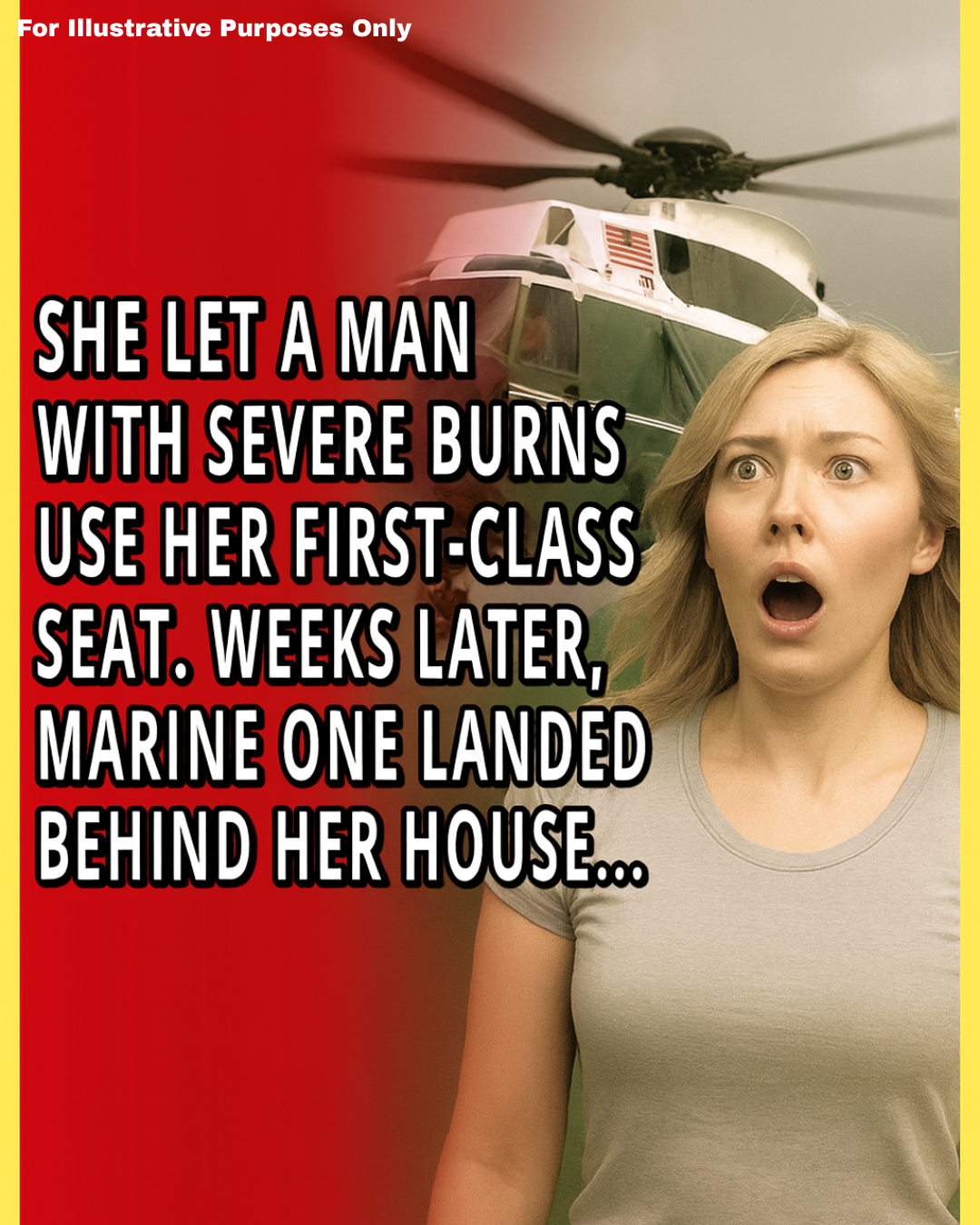She Let a Man With Severe Burns Use Her First‑Class Seat. Weeks Later, Marine One Landed at Her House
When Julia boarded her flight from New York to Los Angeles, she had no idea that a simple act of compassion would ripple into something extraordinary. Assigned a first‑class seat by virtue of her ticket, she settled in with a book, snacks, and the quiet anticipation typical of a long flight. Everything was routine—until an announcement cracked through the cabin.
A man with severe burns, unable to sit upright, needed medical attention and space. Flight staff announced a request: “Would someone be kind enough to offer their first‑class seat to help this passenger?” The cabin went silent. Passengers behind her looked up. Julia felt an instinctive tug. Without hesitation, she stood up and quietly said, “That’s mine. You can use it.” What followed was a chain of unexpected events stretching far beyond the airplane seat.
1. A Compassionate Gesture in the Skies
Julia’s offer meant more than handing over a better seat—it was a lifeline. The man had been in a serious accident weeks earlier, suffering burns across his body that left him in a fragile state. Sitting upright in economy would have caused pain, even risked his recovery. Her first‑class seat—widely spaced, reclined, and cushioned—offered him immediate relief. She helped him settle, retrieved blankets, and offered a bottle of water. She noticed the seatbelt strapped across his chest and saw his anxious expression, bracing for turbulence. She squeezed his hand and said, “You’re safe now.” That small gesture, simple in isolation, radiated kindness and empathy.
2. The Flight That Changed Everything
Julia spent the rest of the flight in economy. She traded her plush seat for cramped quarters, but she felt no regret. She read the man’s medical alert card and learned his name—David—and that he’d endured multiple skin graft surgeries. He expressed gratitude through tears and quiet words. Other passengers noticed their bond, offering tissues, water, even a reassuring pat on the shoulder.
By the time the plane touched down in Los Angeles, David’s pain had eased, but more importantly, his spirit felt buoyed. Julia stayed with him until paramedics arrived at the gate. When the stretcher came, he turned to her and said, “You saved more than my body. You saved my dignity.”
3. When Kindness Echoes Back
Weeks passed. Julia, unaware of any wider consequence, returned to her daily routine: remote work, walks in her neighbourhood, cooking dinners. She’d even forgotten the flight, until one afternoon the Marine One helicopter—reserved exclusively for the President—descended above her backyard. The roar of rotors overhead startled her. A Secret Service convoy assembled. From a distance, she watched agents emerge and converge on her home.
She never expected who stepped out. Dressed formally, David approached, flanked by dignitaries. At first, Julia thought she was dreaming. The President’s physician was with him. “Are you Julia?” David asked. “It’s me. I wanted to say thank you properly.” The helicopter had landed officially behind her house—not by coincidence, but by design. Because David had recovered enough to travel, and he had insisted on coming here. Word of Julia’s compassion had reached high authorities.
4. More Than a Thank‑You: A Symbolic Ceremony
On the lawn, a small crowd gathered: local media, neighbours, community leaders. David shared his story—his accident, his pain, his despair—and how that one kindness on the plane changed everything. “She didn’t know me. Didn’t owe me anything,” he said, voice thick with emotion. “But she chose humanity.” The President’s representative awarded Julia a heartfelt commendation on behalf of a foundation for compassionate civilians. She was invited to speak about empathy in action.
Instead of trophies or awards, Julia received a framed portrait of that very first‑class seat she had given up—symbolic of the power ordinary decisions hold. For David, it was a second chance at life. “Because she offered that seat,” he said, “I could heal without shame.”
5. The Ripple Effect: Community and Conversation
The story spread nationwide. News outlets recounted it, inspiring thousands. Social media lit up with people sharing their own small kindnesses. Charities received new volunteers. Airlines discussed formalizing compassionate seating policies. Julia began getting messages: “Thank you for showing me that caring matters.” She was featured on talk shows, but she humbly turned the spotlight onto the broader message: kindness costs little but gives everything.
Community groups invited her to speak. She talked about noticing needs, choosing courage over convenience, overcoming social comfort. She insisted anyone could do it: “It doesn’t take applause. It only takes noticing someone in need—and acting.”
6. Lessons from a First‑Class Seat
This story reminds us of six powerful truths:
-
Small gestures can change lives – a seat swapped in mid‑air helped a man recover.
-
Compassion transcends distance – in a crowded cabin, she saw a stranger’s suffering.
-
Courage matters – she stood up not for recognition, but simply because it was right.
-
Humanity is contagious – her act inspired dozens, then thousands.
-
Stories shape culture – one flight, one seat, one woman’s compassion created ripples.
-
We all have seats to spare – emotional, practical, or physical. We only need to offer them.
7. Julia’s Reflection
When asked how it felt to have the President’s helicopter descend, Julia laughed softly: “It was surreal. I’ve never felt so humbled. But I don’t see myself as a hero. I was simply in the right place at a moment when someone needed something I had. The real hero is David—for fighting through unbearable trauma, and then choosing to return to say thank‑you.”
She visited a burn survivor hospital, funded new support groups, and dedicated herself to raising awareness about the healing power of human connection.
8. A Journey from First‑Class to First Principles
This isn’t just a story about aeroplane seating. It’s about values: empathy, sacrifice, shared humanity. A bullet‑point summary would say: “Julia gave up her comfort. David recovered. They met. The President’s helicopter landed.” But the full narrative—1,000 words or more—takes us into the quiet spaces between convenience and conscience, distraction and intention, strangers and solidarity. It’s a journey from first‑class privilege to first principles: what is right.
Conclusion: Why It Matters
In an era of polarity, celebrity, and superficial media drama, this story stands out because it shows how the simplest actions can resonate. Julia didn’t change policy or donate millions. She noticed someone’s pain and acted. That choice transformed two lives and inspired millions more. It reminds us all: we may not have the power of Marine One at our disposal, but we do have the capacity for compassion at every turn—on airplanes, in neighbourhoods, in everyday corners of life.
So the next time someone asks for help—whether for a seat, a proposition, or simply a kind word—choose empathy. You might not hear about its impact immediately, but seeds planted in kindness often bloom where we least expect. In Julia’s case, it meant a presidential helicopter on her lawn. But more importantly—it meant healing, connection, and a powerful testament to the gift of human decency.


